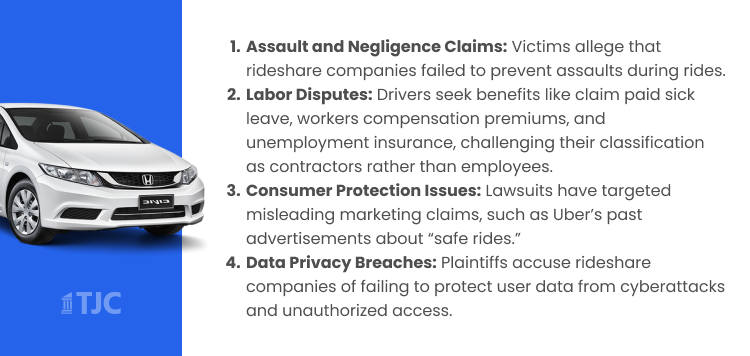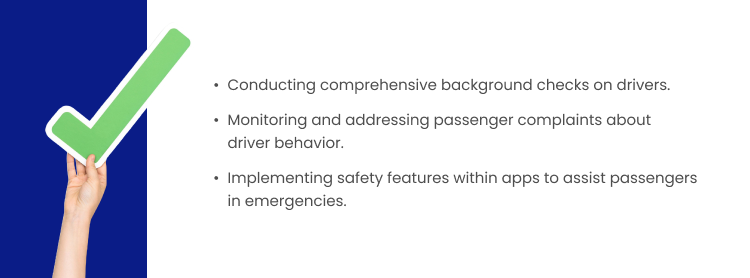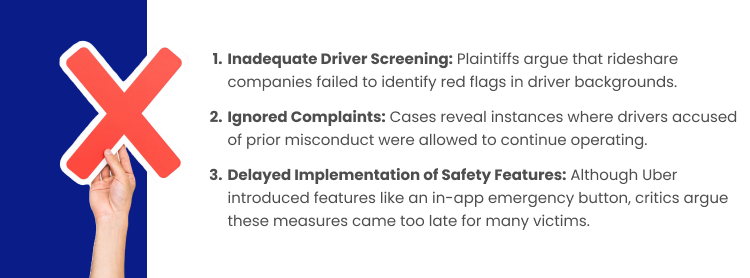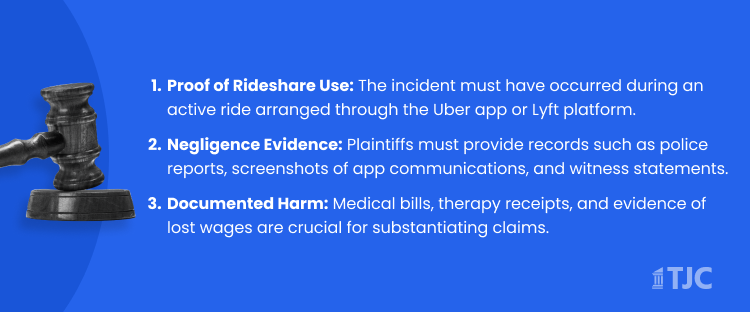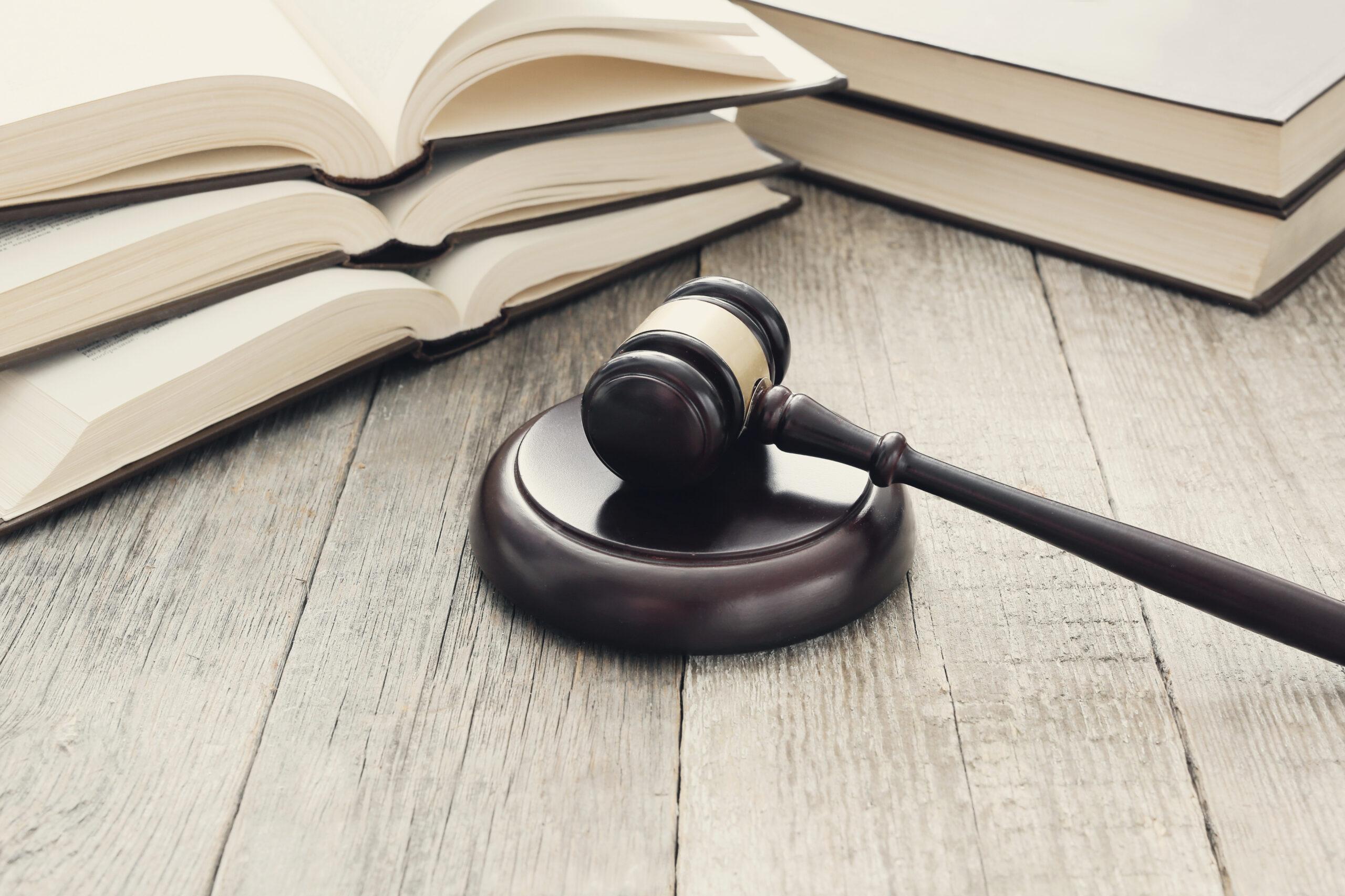The rise of rideshare companies like Uber and Lyft has transformed how we get around. With just a few taps on an app, millions of people can find affordable and convenient transportation. However, behind the ease and accessibility, these companies face mounting legal battles that could shape their future.
In recent years, legal issues have cast a shadow over the rideshare industry, especially with the rise of assault claims. Many victims have filed a rideshare lawsuit against Uber and Lyft, accusing them of failing to provide adequate safety measures for passengers.
As these lawsuits grow in 2023 and 2024, they expose deeper concerns about driver screening, negligence, and the companies’ responsibilities toward passenger and worker safety.
Rideshare Lawsuit Status & Updates
The ongoing Uber rideshare lawsuit highlights various legal challenges the company faces, from labor disputes to passenger safety concerns. Below are the most recent updates on the legal challenges rideshare companies face. These developments, including sexual assault cases and labor disputes, highlight the increasing scrutiny of their practices.
Ongoing Sexual Assault Cases
Sexual assault lawsuits remain a major legal hurdle for Uber and Lyft. In 2023, a significant decision by an appeals court consolidated 80 individual assault claims into multidistrict litigation (MDL). This move aims to streamline pretrial proceedings and improve efficiency for victims pursuing justice.
Plaintiffs in these cases allege that rideshare companies failed to conduct adequate background checks on drivers and ignored previous misconduct complaints. Many victims also claim that the companies did not implement sufficient safety features to protect passengers.
These cases have also highlighted the impact of the arbitration agreement included in Uber’s user terms, which has historically limited passengers’ ability to file lawsuits in open court. Legal experts argue that such agreements restrict access to justice, further intensifying scrutiny of the rideshare industry’s accountability.
Major Settlements in Labor Disputes
In late 2023, Uber reached a historic $290 million settlement with New York State. This case resolved allegations that Uber improperly withheld wages and violated minimum wage requirements. It also addressed claims that the company failed to provide benefits such as guaranteed paid sick leave, which many drivers demanded to address their own mental or physical illness.
As part of the settlement agreement, Uber committed to complying with New York’s strict labor laws, signaling a shift toward improving working conditions.
Workers have long argued that Uber’s classification of drivers as independent contractors denies them rights such as sick pay and unemployment benefits. These disputes remain central to the broader legal challenges faced by the industry.
California Antitrust Litigation
In California, ongoing antitrust litigation continues to challenge the business practices of Uber and Lyft. Drivers argue that being classified as independent contractors while adhering to fixed pricing undermines their autonomy and constitutes anti-competitive behavior under California law.
One key aspect of these disputes is the role of the Uber driver app in setting rates and controlling driver behavior. Many drivers claim that the app’s functionality contradicts their classification as independent contractors, further fueling tensions between labor advocates and rideshare companies.
On July 25, 2024, the California Supreme Court unanimously upheld Proposition 22 in Castellanos v. State of California. This 2020 ballot measure allows rideshare companies to legally classify their drivers as independent contractors rather than employees, a significant win for gig economy businesses.
However, the court ruled that while Proposition 22 is valid, pricing policies could still face regulatory scrutiny. Drivers claim that Uber and Lyft’s price-setting practices restrict their ability to operate as true independent contractors, violating California’s antitrust laws.
The outcome of these cases could reshape how rideshare companies define worker relationships and manage pricing strategies, potentially influencing similar legal battles across the United States.
What is a Rideshare Class Action Lawsuit?
Class action lawsuits enable individuals with similar grievances to join forces against a common defendant. While Uber and Lyft have faced numerous lawsuits, their assault cases have been consolidated into MDL rather than a traditional class action. This distinction allows each plaintiff’s case to be evaluated individually while benefiting from shared pretrial resources.
Broader Categories of Rideshare Lawsuits
Rideshare lawsuits fall into several categories, reflecting the diverse range of issues affecting passengers and drivers:
- Assault and Negligence Claims: Victims allege that rideshare companies failed to prevent assaults during rides.
- Labor Disputes: Drivers seek benefits like claim paid sick leave, workers compensation premiums, and unemployment insurance, challenging their classification as contractors rather than employees.
- Consumer Protection Issues: Lawsuits have targeted misleading marketing claims, such as Uber’s past advertisements about “safe rides.”
- Data Privacy Breaches: Plaintiffs accuse rideshare companies of failing to protect user data from cyberattacks and unauthorized access.
Class actions and MDLs serve as essential mechanisms for addressing systemic issues, offering plaintiffs a path to justice against powerful corporations.
Uber & Lyft Rideshare Assault Lawsuit Legal Basis
Sexual assault lawsuits against rideshare companies have surged in recent years, underscoring significant gaps in passenger safety measures. Between 2019 and 2020, Uber reported 3,824 cases of sexual assault, while Lyft documented over 4,000 incidents between 2017 and 2019.
Victims claim that these assaults could have been prevented if rideshare companies had implemented better safety protocols.
Legal obligations of rideshare companies:
Rideshare companies are legally obligated to ensure passenger safety. Key responsibilities include:
- Conducting comprehensive background checks on drivers.
- Monitoring and addressing passenger complaints about driver behavior.
- Implementing safety features within apps to assist passengers in emergencies.
Failing to meet these obligations can result in negligence or breach of duty lawsuits.
Examples of negligence in assault claims:
Victims frequently allege the following:
- Inadequate Driver Screening: Plaintiffs argue that rideshare companies failed to identify red flags in driver backgrounds.
- Ignored Complaints: Cases reveal instances where drivers accused of prior misconduct were allowed to continue operating.
- Delayed Implementation of Safety Features: Although Uber introduced features like an in-app emergency button, critics argue these measures came too late for many victims.
These lawsuits seek accountability from rideshare companies for failing to protect their users.
Claim Requirements
Plaintiffs must typically meet the following criteria:
- Proof of Rideshare Use: The incident must have occurred during an active ride arranged through the Uber app or Lyft platform.
- Negligence Evidence: Plaintiffs must provide records such as police reports, screenshots of app communications, and witness statements.
- Documented Harm: Medical bills, therapy receipts, and evidence of lost wages are crucial for substantiating claims.
Labor-related lawsuits require drivers to prove their eligibility for benefits under federal and state labor laws, particularly in states like California with stricter regulations.
Compensation for Rideshare Lawsuit
Victims involved in a rideshare lawsuit may be eligible for three types of compensation. These types of compensation address various financial, emotional, and punitive concerns.
Economic Damages
Economic damages cover measurable financial losses incurred as a result of the incident. These damages are straightforward to calculate and include:
- Medical Expenses: Compensation for hospital bills, surgeries, physical therapy, and medication. For example, Uber provides bodily injury liability coverage of up to $50,000 per person when a driver waits for ride requests. This increases to $1,000,000 if the driver has accepted a ride or is transporting passengers.
- Lost Wages: Victims who miss work due to physical injuries or emotional trauma can recover lost income. This can include both past and future earnings if the injuries have long-term consequences.
Settlements in economic damage cases can vary. Under certain liability conditions, property damage coverage of up to $25,000 per accident is available.
Non-Economic Damages
Non-economic damages are awarded for intangible losses that don’t have a clear monetary value. These include:
- Emotional Distress: Compensation for anxiety, depression, or emotional trauma resulting from the incident. Victims of assault or accidents often experience long-term psychological effects that disrupt their lives.
- Pain and Suffering: Courts may consider the physical and emotional toll on a victim’s overall quality of life, including difficulty performing daily tasks or enjoying activities they once loved.
For example, victims of sexual assault often report lasting psychological damage, such as PTSD. These non-economic damages recognize the profound impact incidents have beyond measurable costs.
Punitive Damages
Punitive damages are awarded in cases of gross negligence or willful misconduct. Unlike economic and non-economic damages, these are designed to punish the defendant and deter similar actions in the future.
For rideshare companies, punitive damages might apply if they knowingly failed to address safety concerns, such as hiring drivers with criminal records or ignoring repeated complaints. For example, courts may impose punitive damages if evidence shows that the company overlooked systemic issues contributing to a victim’s harm.
Now, what influences the settlement or judgment value?
Several factors determine the amount of compensation a plaintiff may receive:
- Severity of the Harm: Serious injuries or life-altering events typically result in higher compensation.
- Quality of Evidence: Strong documentation, including police reports, medical records, and witness statements, strengthens a case.
- Insurance Coverage: Uber maintains robust liability coverage of up to $1,000,000 during active trips, but settlement amounts vary depending on whether the driver was online, en route, or transporting passengers.
- Company’s Willingness to Settle: Rideshare companies often prefer to settle cases to avoid costly trials, though they may fight claims they believe lack merit.
Victims should work closely with experienced attorneys to ensure they receive the full compensation they deserve. This includes factoring in all current and future expenses related to the incident, both tangible and intangible.

Discover Your Potential Compensation
Get an instant estimate for personal injury claims
How to File a Claim Against a Rideshare Company
Filing a claim for a rideshare lawsuit requires taking specific steps to protect your rights. Injury, assault, or financial disputes require clear steps to build a strong case and secure fair compensation. Following a structured approach helps protect your rights and strengthens your claim.
1. Document the Incident
Every detail of the incident should be recorded as soon as possible. Save ride receipts from the Uber app, noting the driver’s name, car details, and trip timeline. Screenshots of conversations with the driver or rideshare support should also be kept. These records show critical evidence of the incident and how the company responded.
Photographs add further support to your case. Capture any injuries, damage to property, or unsafe conditions. Take multiple angles to provide a clear picture of what happened. If other people witnessed the event, ask for their contact information. Witness testimony can be pivotal in strengthening your claim.
2. File a Police Report
A police report is an official account of the incident and is often essential in legal proceedings. Contact local law enforcement immediately after the event. Provide a detailed explanation of what occurred, including any injuries, property damage, or threatening behavior by the driver.
Ask for a copy of the police report and review it to ensure accuracy. This report can act as an unbiased account that supports your claim. Insurance companies and courts often rely on police reports as key evidence in determining responsibility and liability.
3. Seek Medical Care
Medical attention is important, even if your injuries seem minor. Certain issues, such as soft tissue injuries or internal trauma, might not show symptoms right away. An evaluation from a doctor ensures proper treatment and creates a medical record of your injuries.
Keep all medical bills, doctor’s notes, and treatment plans. These documents provide clear evidence of the physical and emotional toll of the incident. Medical records also play a significant role in determining compensation for pain and suffering in a rideshare lawsuit.
4. Hire a Rideshare Attorney
Legal representation from an experienced attorney is crucial for rideshare claims. Lawyers specializing in these cases understand the unique challenges, including disputes over driver classification, liability, and insurance limits.
Your attorney will analyze the evidence, identify responsible parties, and calculate damages. They can negotiate settlements that account for medical expenses, lost wages, and even pain and suffering. If the case goes to trial, a skilled lawyer will represent you and present a compelling argument for maximum compensation.
5. Collect and Preserve Evidence
Evidence is the foundation of your case. Organize all documents, including medical records, police reports, and ride-sharing company communication. Emails, texts, and app notifications showing their response or lack of action should be saved.
Witness statements should also be documented if possible. People who saw the incident can provide independent accounts that support your version of events. Having all this evidence ready ensures your lawyer can present a strong and well-supported claim.
6. Understand Your Legal Rights
Rideshare companies often include arbitration clauses in their user agreements, which can complicate lawsuits. Legal advice ensures you know whether arbitration applies or if you can proceed with a court claim. Attorneys familiar with rideshare cases often find ways to challenge or navigate these clauses.
Taking action quickly protects your rights. The sooner steps are taken, the easier it is to secure evidence, build a case, and increase the likelihood of a favorable settlement or judgment. Acting decisively ensures justice in a rideshare lawsuit and holds those responsible accountable.
Other Uber Lawsuits
Uber’s legal challenges go beyond assault cases. Below, we outline some of the major lawsuits Uber has faced and its responses.
False Advertising Claims
In 2016, Uber settled a lawsuit for $28.5 million after being accused of misleading consumers about the safety of its rides. The case focused on claims that Uber used the “safest ride on the road” slogan while failing to implement driver background checks.
The lawsuit revealed that Uber’s vetting process was less rigorous than that required for taxi drivers. As part of the settlement, Uber agreed to change its advertising practices to ensure transparency about its safety measures.
Disability Discrimination
In 2021, Uber resolved a lawsuit alleging violations of the Americans with Disabilities Act (ADA). The company faced accusations of charging wait-time fees to passengers with disabilities, penalizing them for requiring extra time to enter vehicles.
Uber settled the case for millions of dollars and agreed to update its policies to exempt passengers with disabilities from these fees. This case underscored the need for inclusivity in Uber’s services.
Driver Misclassification
Uber has faced recurring lawsuits for classifying its drivers as independent contractors instead of employees.
One significant case occurred in Alaska, where Uber was accused of failing to pay workers’ compensation premiums and unemployment insurance. Uber settled the case by paying fines but ultimately ceased operations in Anchorage. Nationwide, Uber continues to face challenges over this classification, as it prevents the company from providing employee benefits like healthcare and paid time off.
In a 2019 settlement, Uber agreed to pay $20 million to drivers who argued they were wrongly classified. Despite these payouts, Uber maintains that its drivers are freelancers, supporting its business model but inviting ongoing legal battles.
California’s Assembly Bill 5, passed in 2020, further complicated this issue by tightening the criteria for classifying workers as independent contractors.
Car Accident Liability
Uber has been sued frequently for accidents caused by its drivers. Uber’s 2019-2020 safety report shows 101 fatalities from Uber-related crashes during that period. Among these, 38% involved Uber drivers, while 21% were passengers.
Victims of these accidents include pedestrians, cyclists, and other motorists. Uber provides up to $1 million in third-party liability insurance for accidents occurring during active rides, but lawsuits often focus on whether Uber adequately oversees its drivers.
Data Breach Lawsuits
In 2016, Uber suffered a massive data breach that exposed the personal information of 57 million users, including drivers and passengers. The breach included names, phone numbers, email addresses, and driver’s license numbers. Uber faced lawsuits nationwide, accusing the company of negligence in securing user data.
In 2018, Uber settled these cases for $148 million. Another breach in 2022 further highlighted ongoing vulnerabilities, sparking additional lawsuits and regulatory investigations.
Wage Theft and Labor Violations
In 2023, Uber paid a $290 million settlement to resolve wage theft claims in New York. Drivers alleged that the company improperly withheld earnings, failed to provide sick leave, and denied them other benefits required by state labor laws.
The settlement marked one of the largest payouts in Uber’s history and forced the company to comply with stricter labor regulations moving forward. Across the U.S., similar lawsuits continue, with drivers demanding fair compensation and better working conditions.
Discrimination Lawsuits
Uber has faced lawsuits alleging discrimination based on disability, race, and gender. For example, passengers with disabilities have claimed that Uber failed to provide accessible vehicles, while racial discrimination lawsuits highlight cases of drivers refusing service based on race.
In 2022, Uber settled a lawsuit for $10 million after female and minority engineers accused the company of pay disparities and workplace bias. Discrimination lawsuits continue to challenge Uber’s commitment to inclusivity and equality.
Wrongful Death Cases
Families of victims killed in Uber-related accidents have filed wrongful death lawsuits, claiming that the company’s negligence contributed to their loved ones’ deaths.
Uber’s 2019-2020 safety report documented 59 fatalities in 2019 and 42 in 2020, accounting for 0.000004% and 0.000006% of total trips, respectively.
These lawsuits often seek damages for funeral costs, lost wages, and emotional suffering while highlighting gaps in Uber’s oversight of driver behavior.
Rideshare Lawsuit FAQs
Can I Sue Both The Driver And The Rideshare Company?
Yes, you can sue both the driver and the rideshare company. Claims against the driver focus on harm caused directly by their actions, such as assault or misconduct during the Uber ride. Lawsuits against Uber target negligence in enforcing safety measures or screening drivers. Holding both accountable increases the chances of a fair outcome.
Uber lawsuits often highlight gaps in Uber policies. For example, some victims allege that drivers with prior complaints were allowed to continue driving. Others claim the company failed to implement effective safety features to prevent incidents. Pursuing claims against both parties ensures all responsible are held liable.
When Will I Receive Settlement Money for the Uber and Lyft Lawsuit?
Receiving settlement funds can take time. For multidistrict litigation (MDL) cases like Uber’s assault lawsuits, pretrial proceedings began in 2023. Trials might not start until 2025 or 2026. Settlements will only be distributed after those verdicts.
For individual claims, the process may move faster if the facts are clear. These cases can settle out of court more quickly than MDLs. However, the timeline depends on the company’s willingness to negotiate and the strength of your evidence.
Are Rideshare Companies Legally Obligated To Ensure Passenger Safety?
Yes, rideshare companies are legally required to take steps to protect passengers. This includes conducting background checks, handling complaints, and offering safety features like the Uber app’s emergency button. These measures are designed to prevent harm during rides.
When companies fail to meet these obligations, they can face lawsuits. Victims often argue that negligence, such as poor driver screening or lack of action on complaints, contributed to their injuries. Rideshare companies must prioritize safety to avoid legal and reputational harm.
Conclusion
The lawsuits against Uber and Lyft underscore the importance of accountability in the rideshare industry. From labor disputes to assault claims, these cases highlight significant safety, transparency, and compliance gaps. As the legal challenges unfold, they have the potential to reshape how rideshare companies operate, offering a safer and more equitable future for passengers and drivers alike.
If you’ve experienced harm during a rideshare trip, seeking legal action protects your rights and contributes to broader changes in the industry. Rideshare companies must prioritize the well-being of their users, ensuring their innovative platforms remain both convenient and safe.
Disclaimer: The information provided in this article is for informational purposes only and does not constitute legal advice. Readers should consult with a licensed attorney for legal guidance regarding their specific situation. The content is not intended to create, and receipt of it does not constitute an attorney-client relationship.

